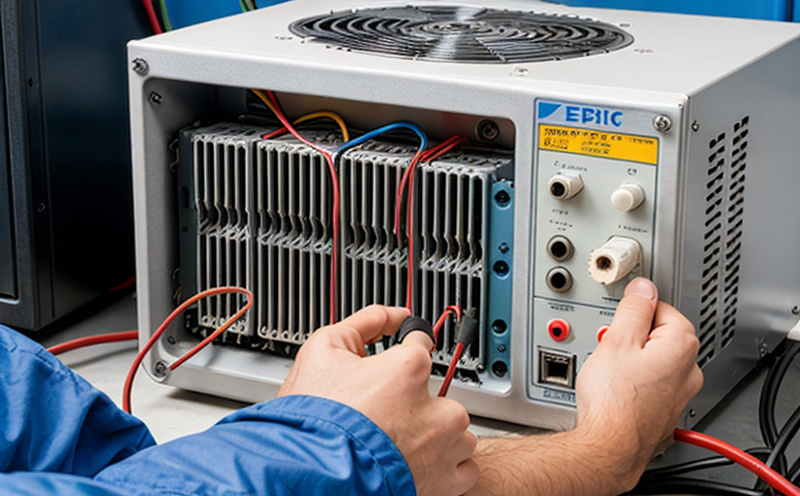IEC 60945 EMC Testing of Marine Electrical Equipment
The International Electrotechnical Commission (IEC) standard IEC 60945 specifies the electromagnetic compatibility (EMC) testing requirements for electrical and electronic equipment intended to be used on board ships or in similar maritime environments. This standard ensures that marine electrical systems function reliably under various environmental conditions, including interference from other shipboard electrical devices and external electromagnetic sources.
Electrical and power systems are critical components of modern vessels, responsible not only for powering the ship's propulsion system but also for providing essential services such as lighting, communication, navigation, and safety equipment. Given the harsh marine environment, these systems must be robust against electromagnetic interference (EMI) to ensure reliable performance.
EMC testing according to IEC 60945 is a crucial step in validating that electrical devices meet the specified EMC requirements. This process involves subjecting the device under test (DUT) to various electromagnetic fields and measuring its response to determine if it complies with international standards.
The testing procedure typically includes several stages, each designed to evaluate different aspects of the device’s susceptibility to interference and its own emission characteristics:
- Electrostatic Discharge (ESD): Evaluates the DUT's ability to withstand electrostatic discharge events.
- Radio Frequency Interference (RFI): Measures how well the device can operate in the presence of radio frequency signals without being affected by them.
- Electromagnetic Compatibility (EMC) Testing: Assesses both the susceptibility and emissions of the device to ensure it operates correctly within its intended environment.
DUTs must be prepared for testing according to specific guidelines outlined in IEC 60945. This includes ensuring that all connections are secure, grounding is properly set up, and any necessary shielding or isolation measures have been applied. The test setup replicates the real-world conditions under which the equipment will operate.
The results of these tests are crucial for compliance with international regulations such as SOLAS (International Convention for the Safety of Life at Sea) and other maritime standards that mandate EMC testing for electrical devices used on board ships. Compliance ensures not only operational reliability but also safety, particularly in environments where failures could lead to catastrophic consequences.
Failure to meet these standards can result in significant legal and financial penalties, including fines, product recalls, and delays in vessel certification or delivery. Therefore, thorough EMC testing is essential for manufacturers of marine electrical equipment to ensure their products are reliable, safe, and compliant with global regulations.
Why It Matters
The importance of IEC 60945 EMC testing cannot be overstated in the context of marine electrical equipment. EMC issues can lead to malfunctions or failures that disrupt critical operations, jeopardize crew and passenger safety, and result in costly repairs or replacements.
EMC problems are particularly prevalent in maritime environments due to the large number of electrical devices operating simultaneously on board ships. The close proximity of different systems and components increases the likelihood of interference, which can severely impact performance. For instance:
- Critical Systems Interruption: A malfunctioning navigation system or communication device could lead to navigational errors or loss of contact with shore-based authorities.
- Safety Equipment Failure: Life-saving devices such as fire alarms and distress signals may fail during critical moments, endangering lives.
In addition to potential safety hazards, EMC issues can also result in financial losses. Delays caused by equipment failures or the need for costly repairs can significantly impact a ship's operational efficiency and profitability. Therefore, adherence to IEC 60945 ensures that marine electrical equipment is reliable and robust against interference.
Compliance with these standards not only enhances safety but also contributes to environmental protection by minimizing electromagnetic pollution in the maritime environment. By ensuring that devices do not emit excessive levels of electromagnetic radiation, manufacturers can help reduce the overall environmental impact of their products.
Eurolab Advantages
Eurolab is committed to providing comprehensive and accurate IEC 60945 EMC testing services tailored specifically for marine electrical equipment. Our expertise in this field ensures that our clients receive reliable results, which are crucial for achieving compliance with international standards.
- Expertise and Experience: Eurolab's team of engineers has extensive experience in conducting EMC tests according to IEC 60945. We stay updated on the latest testing methodologies and regulatory changes, ensuring that our services remain relevant and effective.
- State-of-the-Art Facilities: Our laboratories are equipped with cutting-edge instrumentation and facilities designed specifically for EMC testing of marine electrical equipment. This allows us to simulate real-world conditions accurately and provide precise test results.
- Comprehensive Reporting: Eurolab provides detailed, easy-to-understand reports that outline the results of each test conducted. These reports are essential for manufacturers to understand their product's performance and identify areas for improvement.
In addition to our technical expertise, Eurolab offers a range of additional services designed to support our clients throughout the testing process:
- Consultation Services: Our consultants can provide guidance on how to design and manufacture products that meet IEC 60945 standards.
- Training Programs: Eurolab offers training programs for quality managers, compliance officers, and R&D engineers to enhance their knowledge of EMC testing.
Our commitment to excellence in marine electrical equipment testing is reflected in the consistently high-quality results we deliver. We pride ourselves on our ability to provide reliable, accurate, and timely test reports that meet the stringent requirements of IEC 60945.





